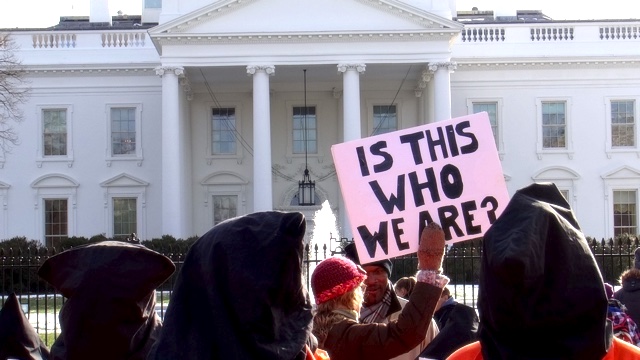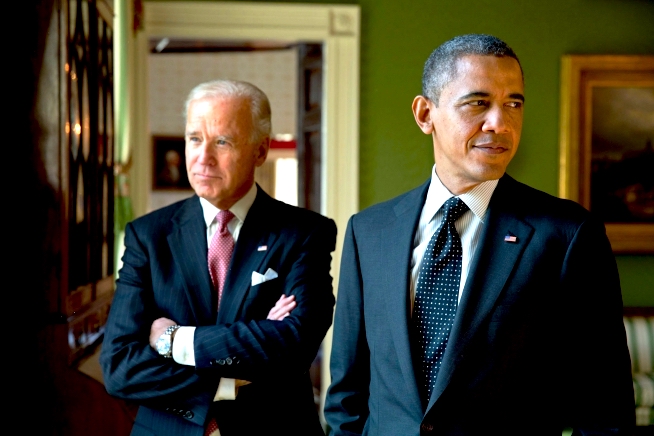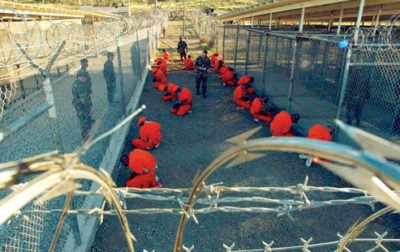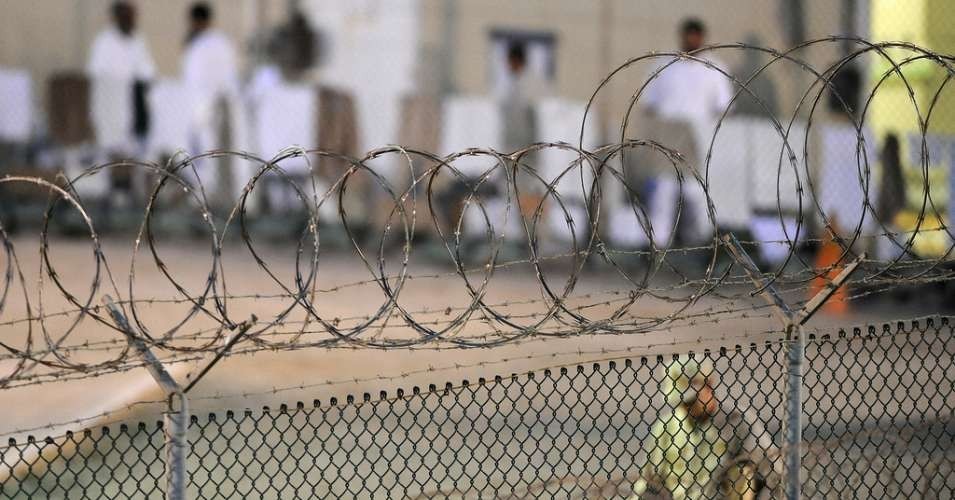Karen J. Greenberg says the offshore prison has become an American institution.

Jan. 11, 2015: Protesting Guantanamo in front of the White House on 13th anniversary of the opening of the prison camp. (Debra Sweet, Flickr, CC BY 2.0)
By Karen J. Greenberg
TomDispatch.com
 The Guantánamo conundrum never seems to end.
The Guantánamo conundrum never seems to end.
Twelve years ago, I had other expectations. I envisioned a writing project that I had no doubt would be part of my future: an account of Guantánamo’s last 100 days. I expected to narrate in reverse, the episodes in a book I had just published, The Least Worst Place: Guantánamo’s First 100 Days, about — well, the title makes it all too obvious — the initial days at that grim offshore prison. They began on Jan. 11, 2002, as the first hooded prisoners of the American war on terror were ushered off a plane at that American military base on the island of Cuba.
Needless to say, I never did write that book. Sadly enough, in the intervening years, there were few signs on the horizon of an imminent closing of that U.S. military prison. Weeks before my book was published in February 2009, President Barack Obama did, in fact, promise to close Guantánamo by the end of his first year in the White House. That hope began to unravel with remarkable speed. By the end of his presidency, his administration had, in fact, managed to release 197 of the prisoners held there without charges — many, including Mohamedou Ould Slahi, the subject of the film The Mauritanian, had also been tortured — but 41 remained, including the five men accused but not yet tried for plotting the 9/11 attacks. Forty remain there to this very day.
Nearly 20 years after it began, the war in Afghanistan that launched this country’s Global War on Terror and the indefinite detention of prisoners in that facility offshore of American justice is now actually slated to end. President Joe Biden recently insisted that it is indeed “time to end America’s longest war” and announced that all American troops would be withdrawn from that country by Sept. 11, the 20th anniversary of al-Qaeda’s attack on the United States.
It makes sense, of course, that the conclusion of those hostilities would indeed be tied to the closure of the now-notorious Guantánamo Bay detention facility. Unfortunately, for reasons that go back to the very origins of the war on terror, ending the Afghan part of this country’s “forever wars” may not presage the release of those “forever prisoners,” as New York Times reporter Carol Rosenberg so aptly labeled them years ago.
Biden & Guantánamo
Just as President Biden has a history, dating back to his years as Obama’s vice-president, of wanting to curtail the American presence in Afghanistan, so he called years ago for the closure of Guantánamo. As early as June 2005, then-Senator Biden expressed his desire to shut that facility, seeing it as a stain on this country’s reputation abroad.
At the time, he proposed that an independent commission take a look at Guantánamo Bay and make recommendations as to its future. “But,” he said then, “I think we should end up shutting it down, moving those prisoners. Those that we have reason to keep, keep. And those we don’t, let go.” Sixteen years later, he has indeed put in motion an interagency review to look into that detention facility’s closing. Hopefully, once he receives its report, his administration can indeed begin to shut the notorious island prison down. (And this time, it could even work.)
Please Support Our Spring Fund Drive!
It’s true that, in 2021, the idea of shutting the gates on Guantánamo has garnered some unprecedented mainstream support. As part of his confirmation process, Secretary of Defense Lloyd Austin, for instance, signaled his support for its closure. And Congress, long unwilling to lend a hand, has offered some support as well. On April 16, 24 Democratic senators signed a letter to the president calling that facility a “symbol of lawlessness and human rights abuses” that “continues to harm U.S. national security” and demanding that it be shut.
As those senators wrote,
“For nearly two decades, the offshore prison has damaged America’s reputation, fueled anti-Muslim bigotry, and weakened the United States’ ability to counter terrorism and fight for human rights and the rule of law around the world. In addition to the $540 million in wasted taxpayer dollars each year to maintain and operate the facility, the prison also comes at the price of justice for the victims of 9/11 and their families, who are still waiting for trials to begin.”
Admittedly, the number of signatories on that letter raises many questions, including why there aren’t more (and why there isn’t a single Republican among them). Is it just a matter of refusing to give up old habits or does it reflect a lack of desire to address an issue long out of the headlines? Where, for example, was Senate Majority Leader’s name, not to mention those other 25 missing Democratic senatorial signatures?
And there’s another disappointment lurking in its text. While those senators correctly demanded a reversal of the Trump administration’s “erroneous and troubling legal positions” regarding the application of international and domestic law to Guantánamo, they failed to expand upon the larger context of that forever nightmare of imprisonment, lawlessness, and cruelty that affected the war-on-terror prisoners at Guantánamo as well as at the CIA’s “black sites” around the world.
Still, that stance by those two-dozen senators is significant, since Congress has, in the past, taken such weak positions on closing the prison. As such, it provides some hope for the future.
For the rest of Congress and the rest of us, when thinking about finally putting Guantánamo in the history books, it’s important to remember just what a vast deviation it proved to be from the law, justice, and the norms of this society. It’s also worth thinking about the American “detainees” there in the context of what normally happens when wars end.
Prisoners of War
Defying custom and law, the American war in Afghanistan broke through norms like a battering ram through a gossamer wall. Guantánamo was created in just that context, a one-of-a-kind institution for this country. Now, so many years later, it’s poised to break through yet another norm.
Usually, at the end of hostilities, battlefield detainees are let go. As Geneva Convention III, the law governing the detention and treatment of prisoners of war, asserts: “Prisoners of war shall be released and repatriated without delay after the cessation of active hostilities.”
That custom of releasing prisoners has, in practice, pertained not only to those held on or near the battlefield but even to those detained far from the conflict. Before the Geneva Conventions were created, the custom of releasing such prisoners was already in place in the United States. Notably, during World War II, the U.S. held 425,000 mostly German prisoners in more than 500 camps in this country. When the war ended, however, they were released and the vast majority of them were returned to their home countries.
When it comes to the closure of Guantánamo, however, we can’t count on such an ending. Two war-on-terror realities stand in the way of linking the coming end of hostilities in Afghanistan to the shutting down of that prison.
First, the Authorization for the Use of Military Force that Congress passed right after the 9/11 attacks was not geographically defined or limited to the war in Afghanistan. It focused on but was not confined to two groups, the Taliban and al-Qaeda, as well as anyone else who had contributed to the attacks of 9/11. As such, it was used as well to authorize military engagements — and the capture of prisoners — outside Afghanistan. Since 2001, in fact, it has been cited to authorize the use of force in Pakistan, Yemen, Somalia and elsewhere. Of the 780 prisoners held at Guantánamo Bay at one time or another, more than a third came from Afghanistan; the remaining two-thirds were from 48 other countries.
A second potential loophole exists when it comes to the release of prisoners as that war ends. The administration of George W. Bush rejected the very notion that those held at Guantánamo were prisoners of war, no matter how or where they had been captured. As non-state actors, according to that administration, they were exempted from prisoner of war status, which is why they were deliberately labeled “detainees.”
Little wonder then that, despite Secretary of Defense Austin’s position on Guantánamo, as The New York Times recently reported, Pentagon spokesman John Kirby “argued that there was no direct link between its future and the coming end to what he called the ‘mission’ in Afghanistan.”
In fact, even if that congressional authorization for war and the opening of Guantánamo on which it was based never were solely linked to the conflict in Afghanistan, it’s time, almost two decades later, to put an end to that quagmire of a prison camp and the staggering exceptions that it’s woven into this country’s laws and norms since 2002.
A ‘Forever Prison’?
The closing of Guantánamo would finally signal an end to the otherwise endless proliferation of exceptions to the laws of war as well as to U.S. domestic and military legal codes. As early as June 2004, Supreme Court Justice Sandra Day O’Connor flagged the possibility that a system of indefinite detention at Guantánamo could create a permanent state of endless legal exceptionalism.
She wrote an opinion that month in a habeas corpus case for the release of a Guantánamo detainee, the dual U.S.-Saudi citizen Yaser Hamdi, warning that the prospect of turning that military prison into a never-ending exception to wartime detention and its laws posed dangers all its own. As she put it, “We understand Congress’ grant of authority for the use of ‘necessary and appropriate force’ to include the authority to detain for the duration of the relevant conflict, and our understanding is based on longstanding law-of-war principles.” She also acknowledged that, “If the practical circumstances of a given conflict are entirely unlike those of the conflicts that informed the development of the law of war, that [the] understanding [of release upon the end of hostilities] may unravel. But,” she concluded, “that is not the situation we face as of this date.”
Sadly enough, 17 years later, it turns out that the detention authority may be poised to outlive the use of force. Guantánamo has become an American institution at the cost of $13 million per prisoner annually. The system of offshore injustice has, by now, become part and parcel of the American system of justice — our very own “forever prison.”
The difficulty of closing Guantánamo has shown that once you move outside the laws and norms of this country in a significant way, the return to normalcy becomes ever more problematic — and the longer the exception, the harder such a restoration will be. Remember that, before his presidency was over, George W. Bush went on record acknowledging his preference for closing Guantánamo. Obama made it a goal of his presidency from the outset. Biden, with less fanfare and the lessons of their failures in mind, faces the challenge of finally closing America’s forever prison.
With all that in mind, let me offer you a positive twist on this seemingly never-ending situation. I won’t be surprised if, in fact, Biden actually does manage to close Guantánamo. He may not do so as a result of the withdrawal of all American forces from Afghanistan, but because he seems to have a genuine urge to shut the books on the war on terror, or at least the chapter of it initiated on 9/11.
And if he were also to shut down that prison, in the spirit of that letter from the Democratic senators, it would be because of Guantánamo’s gross violations of American laws and norms. While the letter did not go so far as to name the larger war-on-terror sins of the past, it did at least draw attention directly to the wrongfulness of indefinite detention as a system created expressly to evade the law — and one that brought ill-repute to the United States globally.
That closure should certainly happen under Biden. After all, any other course is not only legally unacceptable, but risks perpetuating the idea that this country continues to distrust the principles of law, human rights, and due process – indeed, the very fundamentals of a democratic system.
This article is from TomDispatch.com.
The views expressed are solely those of the author and may or may not reflect those of Consortium News.
Please Support Our
Spring Fund Drive!







A bit of learned discussion about this may be found at:
Guantanamo: Prospects for Closure
Presented by The National Institute of Military Justice and The Center for National Security.
With Carol Rosenberg and Ben Farley, moderated by Karen J. Greenberg.
The discussion took place on May 06, 2021.
Technically, those held at Guantanamo are not POWs, as Bush/Cheney designated them “detainees”, claiming the captured (and sometimes tortured) human beings were not “state actors” and therefore not protected under the “rules” of “civilized warfare”.
“Released” does not mean set free or even returned to their homelands, but rather sent someplace, to someone to be subject to whatever …
However, out of sight, out of mind, and everything returns to the U$ being moral, upright, and a shining beacon …
and so on and so forth.
To be very clear, in no way do I question the credentials or intentions of Professor Greenberg.
Yet, I do wonder why so many academics, be they legal scholars or environmental scientists, appear to consider or believe that the Dem$ are really, actually, doing or going to do anything to improve (actually, really) the legal system, including its “enforcement” arms or will actually DO anything about environmental collapse beyond spewing nice-sounding words, while pushing things like TPP which puts all power in the corporate rentier class who just happen to profit from war (and its little diversions) and environmental degradation.
Yes.
Some Dem$ are making what appear to be thoughtful noises, on the surface, yet where have the Dem$, as a political party, been these last twenty-odd years?
Fully “On Board” with war, plunder, pillage, extraction, neoliberalism, and deceit.
How many millions of human beings is it “okay” (a “price worth paying”) to kill, injure, make rufugees, widows, widowers, or orphans?
In a sense, this is the same moral question that MUST be posed if capital punishment is embraced: How many innocent human beings be put to death without the whole “process” becoming disgusting?
One?
A dozen?
A hundred?
More?
The response, very often, in both cases is remarkably similar.
“That is not a fair question, and you’ve no right to ask it of me.”
Basically, Guantanamo has somehow, finally, embarrassed a few folks and they just want it to go away.
No questions asked.
Now, I note that a number of commenters, here, myself included, have pushed back against what seem to amount to symbolic actions, rather than addressing systemic pathologies and political cowardice, the underlying reasons our civil society and damnedable military empire are in collapse.
I do hope that Consortium News may regard this as being to their credit of providing a place for serious discussion and respectful disagreement.
One of the “advantages” of traditional M$M is that they can readily ignore the rabble, simply by not providing meaningful spaces for considered and shared analyses.
My great appreciation to this site for hosting debate and even speculation that just might provoke critical thought and invaluable exchange.
Remember when Dementia Joe said he was going to end the war in Yemen? He lied, or possibly was confused by what his memos told him to say that day. Or whatever. He’s not going to close Gitmo. Talk is cheap and easy, and if he doesn’t follow through ( the minimum wage is another good example), well, it goes in the memory hole.
“Guantanamo Bay was seized by the United States during the Second Cuban War of Independence from Spain, which the Americans prefer to call the Spanish American War. The United States intervened in that war in 1898, with the purpose of making Cuba into a U.S. colony, as it did to Puerto Rico and the Philippines. In 1901, the United States Senate passed the Platt Amendment , which demanded that Cuba lease naval bases to Washington. Guantanamo was signed away in perpetuity under the point of a gun, although it is a principle of international law that treaties concluded under military occupation are not valid. After the Revolution, the Cuban constitution repudiated all agreements made “under conditions of inequality.” But the Americans remained. They turned one of Cuba’s most precious natural resources, Guantanamo Bay, into a curse on the lips of the world, as a prison camp for desperate Haitian refugees, and then as a nexus of American international criminality and torture .”
hXXps://blackagendareport.com/content/evacuate-guantanamo-%E2%80%93-it-belongs-cuba
Yeah. Remember the Maine.
~
Lies, lies, lies, and even more lies.
~
Do you know all the lies.
~
Well, there are gonna be more shoved down upon us as I speak. Get ready for some serious ridiculousness.
~
BK
If you consider the money spent on Guantanamo, $540 million annually, or thereabouts per this article if I read it correctly, it is trivial compared to the the funds wasted in the Afghanistan travesty (and so many others) by orders of magnitude. Couple that with more currency that has been spent fighting ethereal weapons of mass destruction in the name of a war against terror and you get a picture of the truth. It is as if the money (trillions and trillions of currency) is being funneled to those entities that profit from nothing but war and destruction and suffering of innocence. Those who think they are at the top have been sucking the lifeblood out of the peasants. This must be a recipe for destroying the spirit of any country.
~
I’m not diminishing the hateful suffering that has been imposed upon the prisoners of that hell-hole, but it is emblematic of how out of whack priorities in the country I reside in have become. It shows how we, the citizens, are beholden to those who profit from war and fear and needless suffering. It saddens me to no end that this has become the “norm”, and it makes me think that our time of reckoning is at hand especially when most don’t even recognize it for what it is or choose to believe that it doesn’t affect them.
~
Mr. Biden shares a large load of the responsibility for causing all of this suffering and to think that he somehow will help bring it to an end is wishful thinking. In fact, if you give it some serious consideration, to think that those in DC even have the capability to cage the harmful behavior of the machine they gladly participate within is naïve. The damage has been done and the hole is now so deep that only the gods and goddesses know if there is a way out.
~
I’ve seen no evidence of any justice when it comes to truth, consider the case of Julian Assange, and so don’t be a fool and think DC can solve any problems anymore. Can you remember the last good thing that came out of that place. Seems to me it has been nothing but torturing others and wasting money for the sake of a few who have no sense when it comes to commonweal. They have stolen the future of our children and the children of future generations that might be and they profit from death.
~
Ah, if it wasn’t so, but it is so, and so now only question left is what if anything is gonna change?
~
Place your bets, and we would prefer, if the bets were placed in either gold or silver. Bets placed with the US $ will be diminished over time accordingly to account for the destruction caused by that fiat currency. The money the few have accumulated ruthlessly is likely to be worthless in just a generation or two.
~
Justice demands retribution when it is denied and eventually the retribution has such a grand magnitude that it basically destroys everything because without justice there can be no human dignity. That is how it seems to me, but don’t give me a hard time, I’m just saying it like I sense it and I want things to get better. It is just, I see no possible future of peace that involves DC. Something big has got to change soon for the sake of us all.
~
BK
“… risks perpetuating the idea that this country continues to distrust the principles of law, human rights, and due process…”
This country absolutely does not have any regard for the principles of law, human rights, or due process. The continued pursuit of Julian Assange by the Biden administration (as just one example) proves as much. The desire to close Guantanimo is motivated solely by optics, and not for any measure of justice or moral righteousness. The fact that Biden is maneuvering to gain political credibility in the world by ending these horrific US policies, while still demonizing and hunting those responsible for exposing to the world just how horrific they are (Manning, Assange, Snowden, et al) is peak irony.
“With all that in mind, let me offer you a positive twist on this seemingly never-ending situation. I won’t be surprised if, in fact, Biden actually does manage to close Guantánamo.”
I’ll take that bet. $50 to the charity of the winner’s choice.
Guantanamo isn’t really a prison. It’s a gulag. The prisoners at Guantanamo are not treated much differently than the Russians who got sucked into the original gulags especially under Stalin. The United States detains them, tortures them, and abuses them. Even today. The US has a lotta damn gall “weaponizing” human rights when we are the world’s worst human rights abuser.